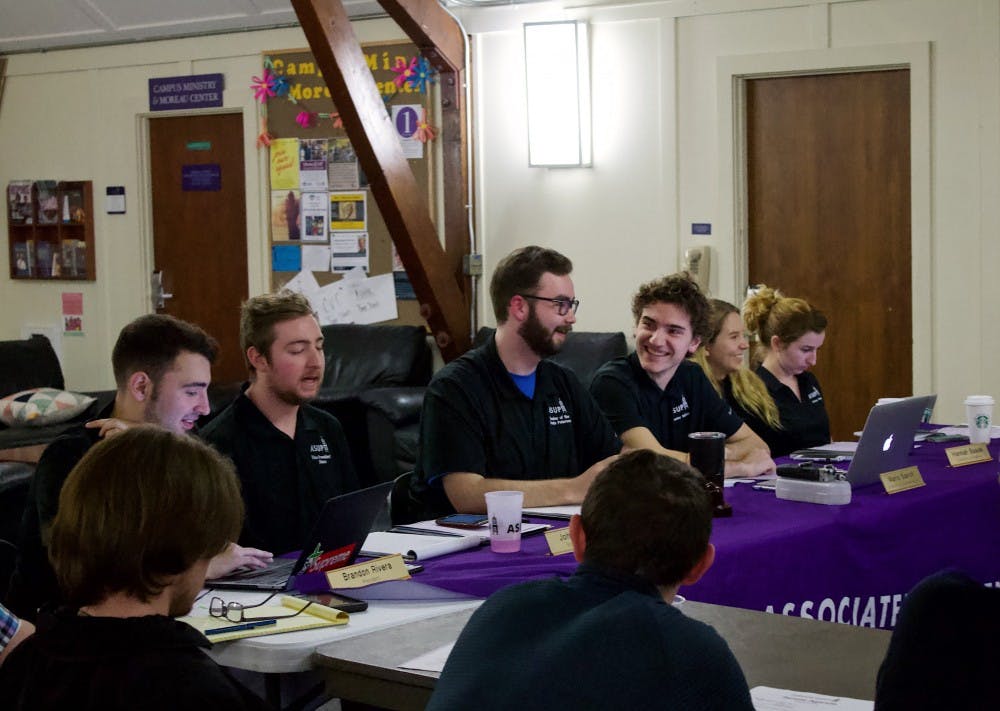In the final minutes of the last Senate meeting of the fall semester, the ASUP (Associated Students of University of Portland) Senate voted to give itself a 10 percent raise, while voting for a 16.6 percent raise for the ASUP president, vice president, director of communications, director of finance, campus program board (CPB) director and speaker of the ASUP Senate.
Senators, whose positions were not paid until this academic year, now receive an annual stipend of $1,100, up from $1,000. All six Executive Board members make $7,000 a year, up from $6,000. The raise, which makes an Executive Board job the highest-paid stipend position on campus, went into effect Jan. 12.
This year’s Executive Board includes ASUP President Brandon Rivera, Vice President John Akers, CPB Director Jacque Nelson, Director of Finance Hannah Baade, Communications Director Mario Sarich and Speaker of the Senate Alex Peterson. Each is required to have 10 office hours each week, and their other duties vary.
The Senate also voted to increase the stipends of service directors for organizations funded by ASUP like Espresso UP, ASUP Films and AdVantage. Overall, the raise will cost $16,700 annually. The money comes from the $95 student government fee all students pay each semester. This fee went up in 2016 from $170/year to $190/year.
Stipend positions on campus are technically considered “volunteer stipends” and generally consist of leadership positions. In addition to ASUP senators and Executive Board, jobs at The Beacon, The Log and KDUP are volunteer stipend positions.
Baade said there was little debate among Executive Board, the Financial Management Board (which consists of students outside of ASUP who work to create the budget) and the Senate as to whether the money for raises could go anywhere else.
“That’s not how our system works,” Baade said. “That conversation doesn’t exist in the process, but the senators could have done that. There are many hands in this pie.”
Rivera said that the raises didn’t take away from any other request for funding.
“During the budget process, our senate critically analyzes the needs and wants of our campus and makes informed decisions through dialogue with clubs and organizations,” Rivera wrote in an email to The Beacon. “The stipends were not picked over one specific club or organization ask.”
Initially, the Executive Board proposed a 20 percent raise for the Senate and a 16.6 percent raise for itself for the spring budget. However, senators chose to take a lower raise of 10 percent and award the Executive Board with the 16.6 percent raise that was originally proposed.
Ten percent and 16 percent pay raises are highly unusual. The U.S. average pay raise is expected to be around 2.9 percent in 2017, according to Aon Hewitt's annual survey on U.S. salary increases.
Hourly positions on campus increased this year from the previous Portland minimum wage of $9.75 to the new minimum wage of $11.25. According to multiple ASUP senators and Executive Board members, this hike in pay was an attempt to keep the roles competitive against an increasing Portland minimum wage.
“You’re not really paid for how many hours you put in. It’s kind of to compensate you for not doing another job,” Baade said. “If this job was underpaid, no one would want to do it. We have to keep the jobs competitive so that ASUP and clubs keep running, basically.”
According to the minutes from the budget meeting at the end of last semester, ASUP advisor and Student Activities Director Jeromy Koffler advised that these stipends are not meant to reflect the Portland minimum wage, rather “volunteer stipends are paid for a role, where the time is irrelevant, but are worth an amount of money that is worth a position’s merit.”
Baade said that Akers, who as vice president supervises all ASUP service directors, saw a surplus in the spring budget of about $60,000 and decided it was the perfect opportunity to raise the wages of employees who he felt do not receive a wage that fairly reflects their work.
“That was how the conversation started,” Baade said. “John was like, ‘Well, we have these employees that do really good work. Why are they so underpaid?’”
With roughly 15 weeks in the spring semester, the Executive Board made about $230 a week before the raise. But according to Baade, Executive Board members work well beyond 20 hours a week.
“I’d say we work the most out of any student jobs on campus, just because the amount of hours in the office we have,” Rivera said.
Though there are specific guidelines in the ASUP Constitution for club funding and budget design by ASUP and the Financial Management Board (FMB), there is no mention in regard to altering stipend amounts.
Baade is also chair of FMB, which according to Koffler, has always been a dual position with director of finance.
“She’s the tie-breaking vote on the FMB,” Koffler said. “The FMB decides, as a committee, and the checks and balances are that the Senate approves the budget. The FMB only gets to propose the budget to the Senate, not make the final decision.”
This time last year, ASUP senators weren’t paid at all. Executive Board voted to give each senator a yearly stipend of $1,000 in spring 2017.
With the new salaries, some senators felt uncomfortable with such a hike in pay so early.
“Some senators felt that the idea of giving themselves a raise was too soon,” Koffler said. “I got the impression that since they just started getting paid, they thought ‘should we be paying ourselves more already?’ The compromise eventually became that they’d cut the raise in half.”
The raise was heavily debated by the ASUP Senate, one dissenting opinion being from College of Arts and Sciences Senator Sitara Nath.
“Initially [my disagreement] was because last semester was the first semester that senators have been paid,” Nath said. “I was not sure if we had enough evidence to justify an increased pay raise. The other thing is that I thought that money could be used to fund other clubs. Being part of Senate means making difficult budget cuts and prioritizing other clubs.”
However, Nath’s stance on the raise has since changed.
“I was saying that if we have this, we need to prove to constituents that we have increased accountability,” Nath said. “What ended up convincing me were some of the changes that came with it.”
ASUP’s way of keeping accountability is the oversight committee, which performs various checks on their office hours and service.
“My job is to go around and make sure everyone is doing what they’re supposed to,” said sophomore Temmo Cramer, head of the oversight committee. “That in its different forms are office hours checks and time reports. We don’t really have problems with that, everyone’s been very good so far this year.”
The 10 percent cut from the initially proposed Senate raise, which added up to $800, went to clubs in need of funding, but every club’s request for funding still got cut. Overall, Baade said clubs requested around $475,000 in funding and received closer to $315,000.
“There's no club that got cut more than the rest, they all got cut equally,” Baade said. “FMB, the Financial Management Board, creates a set of standards. They’re subject to change every year, and even if clubs adhere to this it doesn't mean they might get that exact funding. Some clubs do request money that's not applicable for ASUP funding. Rarely do requests meet the standard. If it doesn’t get cut, you’re meeting the standard.”








